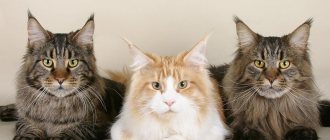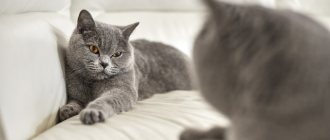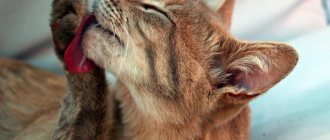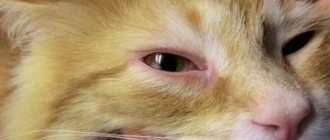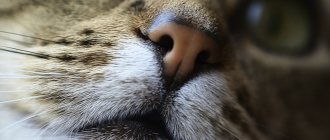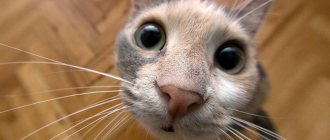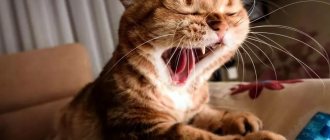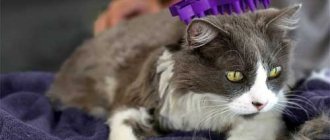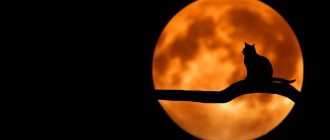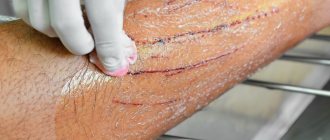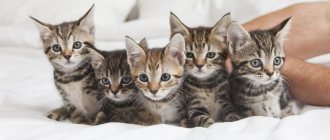10838Administration
When an animal is eating consistently but not gaining weight, pet owners sound the alarm. Many people believe that if a cat eats, then weight gain is a natural process. This is not entirely true. Animals, like people, are active and dynamic, which burns extra calories and helps the pet lose weight. When a cat loses weight but eats well, this is normal. With active life, weight loss is ensured by normal metabolism. The situation is different with sedentary cats.
Don't expect your kitten to actively gain fat. During the first 9-11 months, kittens develop their skeleton and posture, and the baby gets fat and loses weight. Young cats and female cats become soft and plump 1-2 years after birth.
© shutterstock
Safe and dangerous symptoms of weight loss
The cat stopped coming to the bowls, is not interested in food for several days, when is there no need to worry, and when is it time to sound the alarm?
The weight index, which is divided into three positions, will help the owner with this:
- Norm . There is a thin layer of fat on the pet’s ribs, the abdomen is tucked, and the figure is lean. There is no reason to worry.
- Slightly underweight. The skeleton is practically not covered with fat, the figure of the cat is similar to an hourglass. It's time to take action.
- Exhaustion. The animal looks emaciated, the bones are without fat, the abdomen is retracted. You should immediately consult a doctor.
When is it time to sound the alarm?
The cat is drooling: the main causes and treatment options
Cats begin to worry about being thin if:
- the cat eats a lot and often, but does not gain weight, it is too light and small for its breed (thin cats do not gain weight);
- the spine can be traced visually (the ridge literally protrudes outward);
- the pelvic bones and ribs protrude, their movement is clearly noticeable when the cat moves;
- the cat’s breath smells unpleasant (obviously, the gastrointestinal tract is disrupted, the kidneys and liver are not functioning properly, plaque or caries may have formed on the teeth);
- there is no fat layer on the chest and back area, only bone;
- the cat does not show usual attention to toys, sleeps constantly;
- the animal has loose stools (if mucus, blood, or undigested parts of food are found in the stool, consult a doctor);
- yellowness or excessive pallor of the mucous membranes is observed, they become gray in color (most likely, weight loss is due to problems with the liver and kidneys);
- more fluid is released from the eyes, nose and mouth than usual, especially when an unpleasant odor appears, a change in the color of the animal’s tears and saliva;
- the temperature rises (hot nose, the cat is lethargic, to check the temperature it is enough to use a regular thermometer);
- the stomach is sunken, hard, tense.
The silhouette of an emaciated cat resembles an hourglass.
When the described signs appear, the animal is weighed (to do this, just place it in a bag and use a steelyard or in a cardboard box, cover the top with something and put it on a regular floor scale).
If the cat always eats well, but is very thin, weighs 1 kg or more less than it should, contact a veterinarian. It is first necessary to take weight measurements for several weeks in a row to make sure that there really is a reason for concern (cats are thin and do not gain weight for various reasons, but most often due to illness).
What should you do if your pet is weak?
When a cat refuses to eat for a long time, but regularly drinks water and does not have accompanying symptoms of diseases, the owner should:
- Stop giving the animal increased attention, provide the cat with a quiet place with comfortable bedding, where he will not be disturbed by other household members. If a cat is trying to hide, do not disturb the animal.
Important ! You should not try to force feed an animal if the reluctance to eat is due to a psychological factor; force feeding will worsen the situation.
- Try changing your pet's menu.
Be sure to read:
A kitten's eyes are watering: what to do, reasons, norm and pathology, characteristics of different breeds
If alarming symptoms have been added to the refusal to eat, or behavior has changed, it is necessary to undergo an examination at a veterinary clinic.
The veterinarian will examine the oral cavity, measure body temperature, palpate the abdomen, weigh the animal, and prescribe tests. Having identified the picture of the disease, he will recommend adequate treatment. You need to follow the recommendations and give your cat medications on time.
How to feed a cat correctly?
If the cat has lost a lot of weight, the owner may have incorrectly compiled the daily diet and menu for the pet. There are a number of rules thanks to which you can maintain a stable weight of the animal and protect your family pet from threats:
It is important to choose only one food option, otherwise the cat will not only lose weight, but may also get sick. This is a branded industrial feed or natural food. You can find branded food by the labels holistic, premium and supreme. These are classes that confirm compliance with high production standards.
Do not mix natural food and industrial feed. A cat develops one type of digestion, aimed at “artificial” or natural food. Your cat will need more moisture to digest the crackers. With constant changes in diet, the digestive system cannot adapt in a timely manner, which is why the stomach and intestines suffer.
Don't trust advertising. The brand names Whiskas and Kitiket, which have already become household names, do not become a sign of quality . These are affordable feeds to which attractive agents are mixed. These are components that act like a drug and are addictive. This is a serious burden for a pet’s gastrointestinal tract. A cat will live a long time if you feed it food that is sold in specialized stores, and not on supermarket displays.
© shutterstock
Treatment and help at home
You can help your cat at home if the true cause of the weight loss has been established.
If the reason is physiological, you can try changing the diet, depending on the pet’s taste preferences and age, creating comfortable living conditions, purchasing preparations for removing fur, and sedatives (during hormonal surges).
If the cause of a significant decrease in body weight is illness, you should not self-medicate. Treatment is prescribed by a veterinarian.
Why doesn't a castrated cat get fat?
A cat hisses: the main causes of aggression
There is an opinion among owners of cats that have not yet been neutered that as soon as castration occurs, absolutely everything in the character, lifestyle and behavior of the animal will change. Cats become calm and even lazy, stop marking, and begin to quickly gain weight. In relation to probably 70-80% of castrated animals, this opinion is justified, since it is based on the knowledge that after the procedure the hormonal levels change, the cat’s metabolic processes slow down, which means it becomes less energetic. But this doesn't always happen.
Note! If the animal was neutered late, at 1.5-2 years, then there is a high probability that there will be no sudden changes, so the sight of a skinny cat should not be alarming.
The absence of changes in weight is also affected by proper feeding. So, if a cat consumed dry food before castration, then changing the food (switching to natural products) affects the weight (the cat gets fat). If the cat is fed according to the same scheme as before, then no changes occur.
Much also has to do with the breed. British cats immediately after castration begin to consume more food, their body weight quickly increases by 2-3 times. The body weight of a neutered yard cat remains unchanged. The procedure can affect this parameter, but, like with people, everything is individual, some pets cannot gain weight just because of castration, therefore, if the owner dreamed that he would have a fat and very lazy cat, he may have to be disappointed .
Complete refusal to eat
Complete refusal to eat, reluctance to drink water, constant lethargy of a pet is a serious reason to consult a doctor. But sometimes such symptoms accompany severe stress.
In this case, the cat should not be disturbed for a couple of days; perhaps the animal just needs to be in peace and quiet. If the cat's condition does not change after some time, the visit to the clinic cannot be postponed, otherwise the animal may die.
Algorithm of the owner’s actions in case of complete refusal of food:
- Provide your pet with a comfortable, quiet resting place away from drafts.
- Place a bowl of clean water next to the bed.
- Organize regular ventilation of the room.
- Protect the cat from contact with household members and other pets.
- Monitor the condition carefully, and if the condition worsens, take it to a veterinarian.
Causes of exhaustion
Exhaustion, or cachexia, develops under the influence of exogenous (external) and endogenous (internal) factors.
Exogenous
Exogenous external causes of exhaustion include:
- lack of food (emaciation is observed in feral cats and animals that receive food from time to time);
- impaired swallowing functions (the cat has something stuck in its throat, the nasopharynx is inflamed due to an insect bite, under the influence of allergens);
- problems with teeth (inflammation in the oral cavity, caries, tartar - all this prevents the animal from eating its usual food).
Natural Cause of Thinness
An adult cat should receive at least 70 g of dry food per day. If the cat is nursing offspring or is sick, the norm is doubled. At the same time, there should always be only fresh food in the bowl, as many food manufacturers warn about.
Endogenous
Endogenous (internal) factors that provoke cachexia include diseases of a non-infectious and infectious nature. Cats lose weight due to the development of:
- oncological diseases;
- cardiovascular pathologies;
- diabetes mellitus;
- chronic infections (infectious peritonitis, immunodeficiency, leukemia).
Cachexia is caused by hormonal disorders, problems with the pancreas, dysfunction of the kidneys, liver, and pituitary gland.
Sometimes weight loss occurs due to:
- the occurrence of a stressful situation (if the cat is given into the wrong hands, often transported);
- bearing offspring and feeding kittens (nursing cats often become excessively thin, so that a thin cat does not become completely exhausted and gets sick, kittens are weaned as soon as they begin to feed on their own);
- vitamin deficiency (feed must be balanced, it is useful to give the cat additional vitamins);
- formation of hairballs in the stomach (from time to time pets are given special tablets to cough it up);
- infection of the pet’s body with helminths (parasites release dangerous toxins, weaken the cat, their activity over time leads to physical pain, which causes apathy and loss of appetite).
An adult, non-castrated cat loses weight when the heat begins. In the spring, cats literally forget about everything in the world, including food, they move a lot and eat poorly, so they lose weight. Females also lose weight for this reason, but it is males who experience significant changes.
Important! Older cats move less, sleep a lot and, accordingly, eat less, which affects their body weight.
A cat eats poorly and loses weight: when veterinary help is needed
If the pet ignores food for 3-4 days and does not want to drink water, you should urgently take the cat to a veterinary clinic, otherwise dehydration will occur, which will lead to serious consequences, including death.
If excessive thinness is accompanied by elevated body temperature, diarrhea, vomiting, abdominal pain, or a sudden change in behavior, then the cat should be taken to the veterinarian.
Important ! The owner should be wary if the cat, in addition to refusing to eat, constantly tries to hide and does not allow itself to be stroked. This is a sure sign of the development of a serious pathology.
Normal thinness
Why do cats sleep a lot: the main reasons and is it normal?
A cat's weight has a lot to do with its age and breed:
- a domestic mongrel cat at the age of 1 year weighs from 2.5 to 4.5 kg (naturally, the figures may differ, but usually not significantly);
- a purebred cat at 1 year weighs from 3.5 to 5 kg;
- a cat of the British breed, reaching one year of age, weighs up to 4.5-4.6 kg;
- A British cat normally weighs from 4.5 to 7 kg, provided it receives the right amount of food.
Each of the existing cat breeds has its own weight table, which all animal owners must follow.
In a healthy cat:
- it is easy to feel the ribs and spine, but they are not visible from the side;
- there is a small amount of fat in the abdomen, back and chest;
- the waist line is clearly visible;
- the stomach does not sag, it is almost non-existent.
A cat can lose weight or gain weight while feeding or bearing kittens, and a cat during the mating period. This kind of thinness is considered normal. Sometimes an animal suddenly loses weight after experiencing stress (moving, a trip to the veterinarian). And that's okay too. If the kitten’s parents were not large or purebred, then you should not expect that after 1-2 years the pet will turn into a fat lazy cat, as in the picture in the advertisement.
Outbred cats are smaller and lighter than their purebred counterparts and even those animals that appeared as a result of crossing a purebred pet with a barn cat. The kittens will still be larger than those that an ordinary yard cat gives birth to, and accordingly, they will also weigh more.
Signs that should alert you
Having noticed a hint of exhaustion in your pet, the owner needs to take a closer look at the presence of other signs. If the cat is very thin, what should you do in this situation? If exhaustion is a consequence of the disease, then others will certainly be observed.
signs. The following symptoms should alert the owner:
- Decreased appetite, refusal to feed. With dental diseases and stomatitis, the cat approaches food, but does not eat or eats little.
- Bad breath. This phenomenon is observed both in diseases of the oral cavity and in pathologies of the gastrointestinal tract, kidneys, and liver.
- The pet's apathetic state, lethargy, decreased motor activity, the animal spends a long time sleeping.
- Diarrhea, constipation, vomiting and other digestive problems. Blood, mucus, and undigested food particles are signs of a serious gastrointestinal disease.
- Pale or icteric mucous membranes. May indicate problems with the liver and kidneys.
Signs of jaundice in a cat
- Watery eyes and purulent discharge from the eyes are characteristic of many infectious diseases and helminthiases.
- High temperature accompanies numerous infectious and inflammatory diseases.
Genetic miniature
Experienced breeders build genetic lines so that one of the main characteristics of the breed - resemblance to a teddy bear - is well developed. Thin and scrawny cats are removed from breeding.
The situation is different with pets that are bred without permission, pedigree or prior training of the owner. Suppose the cat was not bought for breeding, she grew up miniature and could be an excellent pet, but the owners decided to make money from her by selling kittens.
Mistakes while feeding
Experienced breeders and veterinarians note the following feeding errors:
leading to weight loss in a cat:
- Small portions of food that do not meet the physiological needs of the animal. Some owners do not take into account the breed, age and gender of the animal when feeding.
- An unbalanced diet or its inconsistency with the pet’s needs. For example, chronic protein deficiency sooner or later leads to thinness.
- Feeding without taking into account the animal's taste preferences. Cats are great conservatives, especially when it comes to food. If your pet wants to eat dry food and refuses to eat natural food, then you should feed it with ready-made food.
- Incorrect placement of the food bowl. Close proximity to the toilet, placement in a noisy and walk-through room do not contribute to a good appetite.
For the basic principles of feeding cats, watch this video:
Knowing the numerous causes of weight loss in a pet, the owner will sound the alarm in time. After the veterinarian has ruled out infectious diseases and other serious pathologies in the pet, attention should be paid to proper nutrition of the animal.
In this article I will look at a situation where a cat constantly asks for food. I will name the reasons when the feeling of hunger is justified and, possibly, objectively, and I will also describe the reasons when increased appetite is a pathology. I will give examples of diseases that require a specialized diet.
